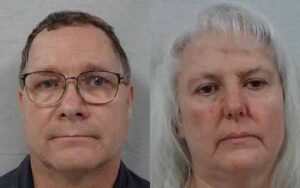
MARION, Ill. (BP)–Southern Baptists must function more like a farm to equal their evangelistic harvest during the mid-20th century, according to Chuck Kelley.
“Old McBaptist had a farm. That is the genius of Southern Baptist evangelism,” said Kelley, who became New Orleans Theological Seminary’s president in March 1996, previously directing its Leavell Center for Evangelism and Church Growth and serving, since 1983, as an evangelism professor.
“Southern Baptists are a harvest-oriented denomination living in the midst of an unseeded generation,” Kelley said in a special-interest conference, “Evangelism in Today’s World,” during the Illinois Baptist State Association’s annual evangelism conference.
“There is a difference between an unseeded field and an infertile field,” said Kelley during the Feb. 10-11 event at First Baptist Church, Marion, Ill. An unseeded field will yield a harvest when planted, he said, while an infertile field will not yield a harvest “no matter what you do.”
“It is easy to look around and think that we now have an infertile field. People just aren’t interested in God anymore,” Kelley said. “But the truth of the matter is there is an enormous spiritual hunger.”
To reap a harvest once again, Southern Baptists must return to a functional farm method of evangelism, Kelley said. Church planting is the “land” part of the farm, he said. “If you’re going to evangelize a community, you have to have a church in that community.
“The denomination cannot evangelize a community. We have to have a church on the ground, functioning, if we’re going to reach that community.”
Decisional preaching is the farm’s “climate,” while personal evangelism is the “planting,” Kelley said. “Cultivation” comes in the form of Sunday school, and revivalism is the church’s “harvesting.”
“The genius of Southern Baptist evangelism was the interaction of those methodologies together,” Kelley said. “When a congregation functions like a farm, evangelism, growth and ministry are the results.”
The farm, however, has stopped functioning, Kelley said. As a result, most Southern Baptist churches have hit their plateau or are declining.
Kelley cited five trends that contributed to the farm’s decline:
— Growth: Ironically, “growth tends to undo itself,” he said. “The great result of growth is a distraction from your central purpose. … No denomination in the history of the United States has ever survived the growth that Southern Baptists experienced.”
— Professionalism: “We have shifted more and more of the work of ministry to the professional minister,” he said. “We have let ministry become professionally oriented, so our people feel less responsible for speaking of Jesus.”
— Responsibilities: “Everybody is busy,” Kelley said. As a result, “a smaller number of people put seed in the ground, talk about Jesus, do the work of ministry. When a smaller number of people do the work, a smaller harvest is the result.”
— Cultural shift: “Our nation has shifted away from being permeated with a Judeo-Christian ethic and belief system,” Kelley said. “You can grow up in the United States of America and have no clue who Jesus is or what he did.”
— Focus shift: “Our churches shifted their focus from the priority of evangelism to evangelism being one on the list of many things,” Kelley said.
The result of all this, he said, is a dysfunctional farm.
“The challenge that we have is to once again tune up that farm, so that our churches can become a place where people meet Jesus.”
Kelley encouraged pastors to answer three “Great Commission” questions in order to get their people to “buy into being a part of the farm:”
— “Am I responsible? … Most believers do not feel responsible,” Kelley said. “They feel like evangelism is for those people who do it really well.”
— “Would my contribution matter? … People need to know that any witness about Jesus they share is significant,” Kelley said. “You don’t have to be a theologian explaining the whole gospel. Just tell what Jesus means to you.”
— “How will I be affected? … The act of being a witness disciples us,” Kelley said. “We are spiritually healthy when we are talking to other people about Jesus.”
Kelley then listed five steps people must take in order to become complete witnesses:
— Illustrate: “We have to work on the behavior of our people. …Behavior matters,” Kelley said. “You must act as a child of God. … We must be light if we are to attract people in darkness.
— Mention: “You have to learn to mention the name of Jesus,” he said. “When you mention his name, it gives people an opportunity to indicate whether or not they’re ready to hear about Jesus.”
— Explain: Southern Baptists each need to have the ability to explain to someone how to become a Christian.
— Invite: This step means simply being willing to ask a person if he or she is ready to be saved.
— Disciple: The final step in becoming a complete witness is to make disciples, “learners,” of people after they are saved.
“If you will not have a farm, you will not have a harvest,” Kelley said. “We have to get back to the farm in order to get back to the harvest.”
–30–













